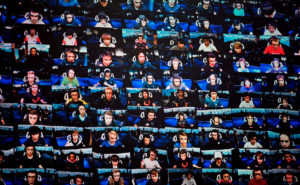The metaverse is going to change everything. And it’s already here. But what the hell is it?
In 2021, it seemed that every major technology executive took a stance on the metaverse, a new concept for the internet. Mark Zuckerberg went so far as to change his company’s name from “Facebook” to “Meta” and massively reorient its research spending towards a 3D virtual reality future. And yet, the concept of the metaverse remained notoriously inchoate.
Matthew Ball’s new book, The Metaverse: And How it Will Revolutionize Everything, is an admirably clear and thorough introduction to what the metaverse is, what technologies will build it, and why we are heading there. What it isn’t, especially, is persuasive. If you came in sceptical that the metaverse is the future, you’ll find little to change your mind. Ball’s description of the kinds of thing you will do in the metaverse sounds very similar to what you would expect a virtual reality booster to say: entertainment! games! interactive education! socialising!
What this fails to convey is what the future will feel like. The engineers and entrepreneurs building the metaverse are understandably excited. They know we are on the cusp of something profound. But by putting the focus on the technology and on the obvious, but trivial, use-cases, they sell themselves short.
You can’t derive the meaning of the internet by explaining how “the TCP/IP protocol” works. Similarly, while hardware challenges will greatly shape the metaverse, understanding them better does not convey how it will reshape society.
For that, we can turn to science fiction. Early in Ball’s book, he provides a gloss on Neil Stephenson’s vision of the metaverse in his 1992 classic, Snow Crash: “A persistent virtual world that reached, interacted with, and affected nearly every part of human existence… a place for labor and leisure, for self-actualisation as well as physical exhaustion, for art alongside commerce.”
If you just encountered this definition in the wild, out of context, you would be forgiven for thinking that it was just talking about the internet. Because the metaverse is actually just the next stage of the internet we have today, made possible by some important breakthroughs. In simple terms, it’s an internet you can make a life in.
To understand what this means, think about the evolution of the internet so far, helpfully summed up in the transition from the world wide web (Web 1) to the social internet (Web 2) to the metaverse (Web 3). To get on the world wide web, you used a modem to dial up on a computer with a hefty cathode-ray-tube monitor (mine was in our family’s humid basement). You conversed and played games with people whose “real” identities were a mystery, and whose virtual identities were often ephemeral, tied to specific message boards or multiplayer games. Everything was free because information on the internet wanted to be: pictures, music, video clips, pirated movies, all shared with peer-to-peer networks like Napster or BitTorrent.
The world wide web, in other words, was a series of exciting destinations, which you surfed, one site after another, by memory, hyperlink, or bookmark. The internet was a place — a place to goof off, explore new ideas, chat with friends, and otherwise escape the monotony of everyday life. And when you were done, you left. You “went offline”, which was the default condition because being “online” meant sitting on the family computer in the basement hogging the phone line.
At least, that was true for most of us. But from the beginning, there were those who found that they could be themselves online, that their online life was more real and true than the one they had offline. Intellectually curious teens in rural communities, would-be artists working dead-end jobs, gay kids in the Deep South — all of them preferred the “social virtual reality” of multiplayer roleplaying games, chatrooms, and internet communities to what awaited them in “the real world”. They weren’t outliers or nerds. They were pioneers.
Fast forward to Web 2. You logged on from a computer, as likely now to be a laptop with wifi as a desktop, and then from your smartphone. By this point, the internet went everywhere you did. And the internet mattered, because it wasn’t a destination you visited like a tourist. The internet became something you were on. Your life was somehow entangled across a small number of platforms that were increasingly personalised, and where you shared your real identity because you wanted to connect with real people.
The important thing social media did was create a “killer app” for the internet, for everyone. Not everybody played video games or had niche hobbies or craved the convenience of online shopping. But everyone cared about their friends and family and experienced Fear Of Missing Out (FOMO) on their social scene.
So whereas in Web 1 users had their offline and online worlds, in the Web 2 era, the two dimensions increasingly merged. Instagram might be fake, but the plastic surgery women get to improve their pictures is very real.
But even as the internet today shapes and channels how we socialise, communicate, learn, work, and entertain ourselves, there’s still, for most of us, something unreal about the goods it can deliver. The internet is where we spend much of our time, but with a logic and a rhythm determined by which platform we are on. We code-switch depending on whether we’re using Twitter or LinkedIn or a video game or email. For anything that really matters, where power or property is concerned, the internet still seems like a dream.
And now, we’re on the cusp of Web 3. The metaverse is just our name for the final evolution of the internet, where the borders between “the real world” and the digital dissolve. The real world will still be out there, but now it will have to compete with other appealing realities. And it’s not clear that those lacking “reality privilege” — who wake up not to a spacious, light-filled apartment but to trailer homes or cramped high-rises — will prefer “meatspace” anymore. In fact, if you know where to look, it’s already clear that they don’t.
As I’ve been attempting to chronicle in an essay series at The New Atlantis entitled “Reality: A Post-Mortem”, the many worlds of the metaverse are not first and foremost alluring VR environments, but bespoke alternate realities made possible by a sheer abundance of information, stories, and people willing to play along. An internet is coming where every community will have the tools to build compelling narrative worlds of their own, big enough to live inside.
The ability to dwell in a virtual world isn’t the product of sophisticated computer renderings but of the human mind. Whether you’re absorbed with massive multiplayer games like Minecraft or Fortnite or prefer discourse-themed video games like Twitter or The New York Times, there will be a compelling reality for you. Want to live in a world where Donald Trump is secretly plotting with the military to arrest a ring of Democrat pedophile lizard people? You can go there today. Believe wokeism is destroying common sense and liberal institutions? Welcome to the Intellectual Dark Web! Fantasising about what how freakin’ awesome it would have been if Ruth Bader Ginsburg had had superpowers? She-Hulk is streaming now on Disney+.
But while the proliferation of alternate realities is plain to see, in what sense is this a metaverse, characterised by the clashing and commingling of these realities? On the one hand, both online and off, our public life is increasingly defined by where and when alternative realities meet. On January 6, you had a mix of MAGA protestors, Alt-Right trolls, and die-hard QAnon believers live-streaming on Twitch as they stormed the Capitol. These streams were then turned into raw data for liberal online volunteer groups with names like “Deep State Dogs” to trawl through and identify insurrectionists to the FBI.
But the existing methods will pale in comparison to what emerges when payment rails, world-building, crypto-property, and other metaversal infrastructure are up-and-running, as Ball shows. For whatever reality appeals to you most, you will have the tools to invest your time and money, build a community and institutions, produce or purchase valuable property, and otherwise live a life that seems meaningful to you. Whether or not this life is in 3D virtual reality, the meaning and the value of it will be irreducibly entangled with the metaverse.
And that’s why Ball’s book is so important. Beneath the hype and the gizmos lies a revolution in human consciousness. “Where your treasure is, there will your heart be also” — in the metaverse.
Disclaimer
Some of the posts we share are controversial and we do not necessarily agree with them in the whole extend. Sometimes we agree with the content or part of it but we do not agree with the narration or language. Nevertheless we find them somehow interesting, valuable and/or informative or we share them, because we strongly believe in freedom of speech, free press and journalism. We strongly encourage you to have a critical approach to all the content, do your own research and analysis to build your own opinion.
We would be glad to have your feedback.
Source: UnHerd Read the original article here: https://unherd.com/





